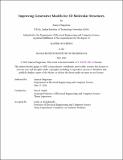| dc.contributor.advisor | Smidt, Tess E. | |
| dc.contributor.author | Daigavane, Ameya | |
| dc.date.accessioned | 2024-08-14T20:12:03Z | |
| dc.date.available | 2024-08-14T20:12:03Z | |
| dc.date.issued | 2024-05 | |
| dc.date.submitted | 2024-07-10T12:59:35.577Z | |
| dc.identifier.uri | https://hdl.handle.net/1721.1/156161 | |
| dc.description.abstract | Generative models have recently emerged as a promising avenue for navigating the high-dimensional space of molecular structures. Such models must be designed carefully to respect the rotation and translation symmetries of molecules. In this thesis, we first provide an overview of existing methods and techniques in this rapidly developing field. Next, we present Symphony, an𝐸(3)-equivariant autoregressive generative model for 3D molecular geometries that iteratively builds a molecule from molecular fragments, improving upon existing autoregressive models for molecule generation and approaching the performance of diffusion models. The material in this thesis is primarily sourced from the publication “Symphony: SymmetryEquivariant Point-Centered Spherical Harmonics for 3D Molecule Generation" [13] authored by Ameya Daigavane, Song Kim, Mario Geiger and Tess Smidt, and published at the International Conference on Learning Representations (ICLR), 2024. | |
| dc.publisher | Massachusetts Institute of Technology | |
| dc.rights | Attribution-NonCommercial-NoDerivatives 4.0 International (CC BY-NC-ND 4.0) | |
| dc.rights | Copyright retained by author(s) | |
| dc.rights.uri | https://creativecommons.org/licenses/by-nc-nd/4.0/ | |
| dc.title | Improving Generative Models for 3D Molecular Structures | |
| dc.type | Thesis | |
| dc.description.degree | S.M. | |
| dc.contributor.department | Massachusetts Institute of Technology. Department of Electrical Engineering and Computer Science | |
| dc.identifier.orcid | https://orcid.org/0000-0002-5116-3075 | |
| mit.thesis.degree | Master | |
| thesis.degree.name | Master of Science in Electrical Engineering and Computer Science | |
